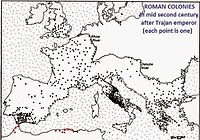Arqa
This article includes a list of general references, but it lacks sufficient corresponding inline citations. (March 2013) |
Arqa
عرقا | |
|---|---|
City | |
UTC+3 (EEST) | |
| Dialing code | +961 |
Arqa (
The town was a notable city-state during the
Names
It is mentioned in Antiquity in the Amarna letters of Egypt-(as Irqata), as well as in Assyrian documents.
The Roman town was named Caesarea (of Lebanon/Phoenicia) or Arca Caesarea.
History
Early Bronze
In the Early Bronze IV, the Akkar Plain had three major sites in Tell Arqa, Tell Kazel, and Tell Jamous.[2] The cultural focus had been towards the south and southern Levant, but now changed with more influence from Inner Syria and the use of copper.
Middle Bronze
In the MB I the Akkar Plain still saw smaller settlements being added near Tell Arqa and the region reach its highest population density in MB II.[3]
Late Bronze
Amarna Period Irqata (c. 1350 BC)
Arqa has the distinction of being a city-state that wrote one of the 382 Amarna letters to the Pharaoh of Ancient Egypt.
The
During Rib-Hadda's lengthy opposition to the Habiru, even the city-state of Irqata and its elders, wrote to the
The letter is entitled: "The city of Irqata to the king".
- This tablet-(i.e. tablet letter) is a tablet from Irqata. To the King, our Lord: Message from Irqata and its el[d]ers. We fall at the feet of the king, our lord, 7 times and 7 times. To our lord, the Sun: Message from Irqata. May the heart of the king, (our) lord, know that we guard Irqata for him.
- When the [ki]ng, our lord, sent 'A[piru]had taken [from] the king,'they wa[ged] war with us against the enemy of our lord, the man whom you pla[ced] over us. Truly—we are guarding the l[and]. May the king, our lord, heed the words of his loyal servants.
- May he grant a gift to his servant(s) so our enemies will see this and eat dirt. May the breath of the king not depart from us. We shall keep the city gate barred until the breath of the king reaches us. Severe is the war against us—terribly! terribly! -EA 100, lines 1-44 (complete)[citation needed]
Hellenistic and Roman period
After the death of
Crusades period
At the time of the
It finally fell to Muslim forces of the Sultan
Later period
In 1838,
Ecclesiastical history
Arca in Phoenicia became the seat of a Christian bishop in the
Of its bishops, Lucianus professed the faith of the
No longer a residential bishopric, Arca in Phoenicia is today listed by the
Latin titular see
The nominally restored diocese has had non-consecutive titular bishops as a Latin Catholic
It is vacant, having had the following incumbents, all of the lowest (episcopal) rank :
- Pedro del Cañizo Losa y Valera (1726.09.21 – ?)
- Józef Krystofowicz (1809.03.28 – 1816.02.26)
- Francisco de Sales Crespo y Bautista (1861.12.23 – 1875.07.05)
- Pierre-Marie Le Berre, Holy Ghost Fathers(C.S.Sp.) (1877.09.07 – 1891.07.16)
- Claude Marie Dubuis (1892.12.16 – 1895.05.22)
- Alfredo Peri-Morosini (1904.03.28 – 1931.07.27)
- Office of the United Nations and Specialized Institutions in Geneva(UNOG) (1978 – 1980)
- Hugo Aufderbeck (1962.06.19 – 1981.01.17)
Maronite titular see
Established as Titular Episcopal See of Arca (Arca dei Maroniti in Curiate Italian); promoted in 1933 as Titular Archiepiscopal See of Arca in Armenia, in 1941 suppressed, but restored in 1950 as Titular Episcopal See of Arca in Phoenicia.
It has had the following incumbents, all of the lowest (episcopal) rank :
- Abdallah Nujaim (1950.07.25 – 1954.04.04)
- Archbishop-Bishopof Nossa Senhora do Líbano em São Paulo of the Maronites (1988.02.27 – 1990.06.09)
- Antioch of the Maronites(Lebanon)
See also
References
- ^ "Municipal and ikhtiyariah elections in Northern Lebanon" (PDF). The Monthly. March 2010. p. 22. Archived from the original on 3 June 2016. Retrieved 3 November 2016.
{{cite web}}: CS1 maint: bot: original URL status unknown (link) - ^ Thalmann 2007:221
- ^ Thalmann 2007:221
- ISBN 978-0-67401683-5), p. 77
- ^ S.M. Cecchini, "Tell'Arqa" in Enciclopedia dell'Arte Antica (Treccani 1997)
- ^ Robinson and Smith, 1841, vol 3, 2nd appendix, p. 183
- ^ Michel Lequien, Oriens christianus in quatuor Patriarchatus digestus, Paris 1740, Vol. II, coll. 823-826
- ^ Konrad Eubel, Hierarchia Catholica Medii Aevi, vol. 7, p. 86
- ^ Pius Bonifacius Gams, Series episcoporum Ecclesiae Catholicae, Leipzig 1931, p. 434
- ISBN 978-88-209-9070-1), p. 837
Bibliography
- Jean-Paul Thalmann (2007) Agricultural practices and settlement patterns in the Akkar plain (Northern Lebanon) in the Late Early and Early Middle Bronze Ages. Pp. 219-232 in : MORANDI-BONACOSSI, D. (ed) Urban and Natural Landscapes of an Ancient Syrian Capital



